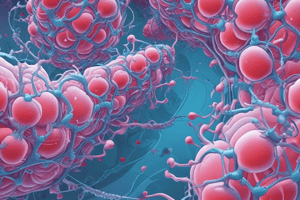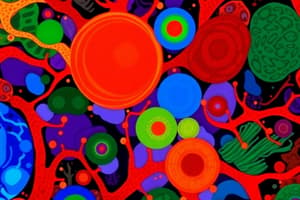Podcast
Questions and Answers
What is the central concept in biology that involves the change in the genetic composition of populations over time?
What is the central concept in biology that involves the change in the genetic composition of populations over time?
- Ecology
- Evolution (correct)
- Taxonomy
- Biotechnology
Which process in biology involves individuals with advantageous traits surviving and reproducing?
Which process in biology involves individuals with advantageous traits surviving and reproducing?
- Natural Selection (correct)
- Inheritance
- Mutation
- Genetic Variation
What field of study complements evolution by understanding interactions among organisms and their environment?
What field of study complements evolution by understanding interactions among organisms and their environment?
- Biotechnology
- Taxonomy
- Genetics
- Ecology (correct)
What is the science of classification that groups organisms based on shared characteristics?
What is the science of classification that groups organisms based on shared characteristics?
Which application of biological processes has revolutionized various aspects of human life?
Which application of biological processes has revolutionized various aspects of human life?
Study Notes
Exploring Science: A Journey through Biology
Biology, a foundational branch of science, ventures into the intricate web of life at its most fundamental level. By delving into the world of cells, organisms, and ecosystems, biologists shine light on the mysteries of our natural world. Let's embark on an educational journey to discover the beauty and complexity of biology.
Cells: The Building Blocks of Life
At the heart of biology lies the cell, the fundamental unit of life. Cells come in two varieties: prokaryotic (bacteria) and eukaryotic (archaea, plants, animals, and fungi). Eukaryotic cells are characterized by a membrane-bound nucleus, while prokaryotic cells lack this structure. Cells are dynamic entities, capable of performing various tasks such as reproduction, metabolism, and communication.
Molecular Biology: The Key to Understanding Life's Building Blocks
Molecular biology, a subdiscipline of biology, focuses on understanding the structure, function, and interactions of biological molecules. DNA, RNA, proteins, and lipids are the most significant molecules in this realm. DNA, the genetic material, is the blueprint for life, encoding information necessary to produce proteins, the workhorses of the cell. RNA, on the other hand, acts as a messenger and catalyst in various cellular processes.
Genetics: The Science of Inheritance and Variation
Genetics, the study of heredity and variation, explores the transmission of traits from one generation to the next. Through the analysis of DNA, scientists have gained insights into the mechanisms of inheritance, mutation, and genetic variation. This knowledge is vital for understanding the evolutionary process, the distribution of traits in populations, and the development of genetically engineered organisms.
Evolution and Ecology: The Dynamics of Life
Evolution, the change in the genetic composition of populations over time, is a central concept in biology. Darwinian evolution by natural selection, the process where individuals with advantageous traits survive and reproduce, drives this change. Ecology, the study of interactions among organisms and between organisms and their environment, complements evolution by understanding the distribution and abundance of species in various ecosystems.
Taxonomy: The Science of Classification
Biologists need a means of organizing and naming the vast array of species on our planet. Taxonomy, the science of classification, accomplishes this goal by grouping organisms based on shared characteristics. This system, characterized by a hierarchical arrangement of kingdom, phylum, class, order, family, genus, and species, provides a framework for understanding the relationships among organisms.
Biotechnology: Applying Biology to Improve Human Life
Biotechnology, the application of biological processes for practical purposes, has revolutionized various aspects of human life. From medicine to agriculture, biotechnology has opened new doors for the development of treatments, diagnostics, and genetically modified organisms.
Conclusion
Biology, a vast and complex field, has provided us with a wealth of knowledge about the intricate web of life. This extensive branch of science has the power to transform our world, enabling us to better understand ourselves, our environment, and our future. Regardless of the specific subdiscipline, biology continues to offer a rich and dynamic landscape of exploration and discovery.
Studying That Suits You
Use AI to generate personalized quizzes and flashcards to suit your learning preferences.
Description
Embark on an educational journey through the intricate web of life with biology as the focal point. Explore cells, molecular biology, genetics, evolution, ecology, taxonomy, and biotechnology to unravel the mysteries of life sciences.




